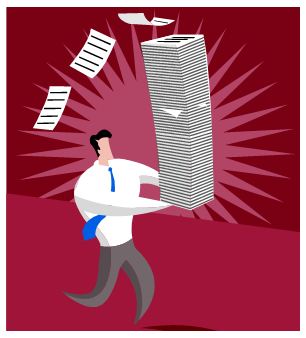Arts authorities caught publicly admitting to experimenting with ditching the ‘waterfall ‘ approach (where committees endlessly prepare vast unread(able) reports before anyone even considers trying anything new) only to discover that they can get strategic projects done quickly and well after all. Gasp!
There was plenty of evidence given here that non-technical, non-geek staff were being introduced to participating in post-waterfall approaches.
It’s easy to forget that in large institutions, all large projects, even non-IT projects, ‘get the waterfall treatment’ with all its legendary shortcomings (committees, reports, reviews, more reports, late implementations, instantly obsolete solutions nonetheless sustained into antiquity whilst awaiting the next, even more delayed and even less up to date solution).
Yes, the project in question did indeed include a web development aspect, and so yes, you could obviously claim that the speaker was just ‘infected’ by the language of the software developers he was working with.
But unless I’m very much mistaken, this is convincing evidence that fashionable ideas about such things as user experience (UX discovery) and pursuing game-like participation of users, as well as a myriad of other ideas mentioned, all of which have hitherto been exclusively confined to the likes of geeky software developers, are now finally beginning to ‘permeate the real world’.
This wan’t the only shock: the results of an exercise which conclusively proved that using ‘crowdsourced taggers’ could actually beat the ‘gold standard’ performance of hand-picked academics was an equally stunning revelation.
There is an insight which I think I can draw from this.
As more and more ‘non-tech’ things are done in conjunction with the web (or mobile apps) and as more and more of the app development community is becoming aware of agile and lean development methodologies, then the more likely it is that this ‘infection of agility’ will produce ‘mutations’ of these development methodologies which will appear in ‘non-software development’ and that ‘agile non software development’ will become a widespread phenomenon.
Even if the connection between agile software development and the agile non-software development that it spurs continues to remain strong (due to the ubiquity of web development) agile non-software development sounds to me like a separate discipline, with its own unique characteristics. I wonder who’ll write the first book on it.
The event in the video was called Digital Day London, (that last link will take you to many other video clips) held on the 7th of July 2011
Here’s an extract from the press release announcing the fund mentioned in the video:
£1/2 Million research fund to stimulate digital innovation in the arts and culture
Arts Council England, the Arts and Humanities Research Council (AHRC) and the National Endowment for Science, Technology and the Arts (NESTA) today (Tuesday 7 June) announced the Digital R&D Fund for Arts and Culture, a new £500,000 fund for projects that will harness digital technologies to connect with wider audiences and explore new ways of working.
‘Through projects like the National Theatre’s NT Live and the Royal Shakespeare Company’s ‘Such Tweet Sorrow’ we’ve already seen the massive potential art and technology partnerships have to transform the way people connect with the arts.
‘How the cultural sectors engage with emerging and existing digital technologies in the next few years will have far reaching effects on our creative, social and economic lives, as artists and audience members.
‘This fund is a golden opportunity for cultural organisations to partner with technical experts, get to grips with the detail, and reap rich rewards. I’m excited to see the ideas they come up with.’
Alan Davey, Chief Executive, Arts Council England
This follows a speech by Culture Minister Ed Vaizey at the National Theatre in January, calling for cultural organisations to embrace new technologies and the opportunities they offer.
Arts and cultural organisations are being asked to work with those with digital expertise to help them understand the potential offered by new technologies and together develop innovative project proposals for submission to the new research fund.
It is hoped that the research and development projects, supported by the Digital R&D Fund for Arts and Culture, will have the potential to produce new data and research insights that can be shared with, and benefit, other organisations in the arts and culture sector.
Hasan Bakhshi, director of creative industries in NESTA’s policy and research unit, says: ‘The rapid development of digital technologies opens up exciting new opportunities for the UK’s world-renowned arts and culture sector. Through this programme we hope to explore what these opportunities are, and rigorously assess them to understand how these technologies can benefit the wider sector.’
Professor Rick Rylance, Chief Executive of the AHRC, says: ‘We’re delighted to be collaborating with NESTA and the Arts Council on this exciting initiative. Digital technologies are manifestly altering our world. We can only glimpse their potential for the performing arts and the transformations they might bring. So we keenly need research. This project offers arts and humanities researchers the chance to work collaboratively with arts organisations and cutting-edge technologists to look into a future that might well be present almost before we know it.’
Ed Vaizey, Minister for Culture, Communications, and the Creative Industries says: ‘I’m delighted to see NESTA, AHRC and the Arts Council collaborating in such a vital area. Our lives are increasingly defined by how we engage and interact with the world digitally and cultural organisations can’t afford to be left behind. Too often finances, structures or traditions can constrain the arts from making best use of the technology which now sits at the heart of many people’s everyday lives. This programme seeks to show how digital technology can revolutionise our cultural engagement, helping people to derive greater value from cultural activities and to find new ways to generate income. I look forward to seeing the innovative and exciting ideas put forward.’
Date: 07 Jun 2011


